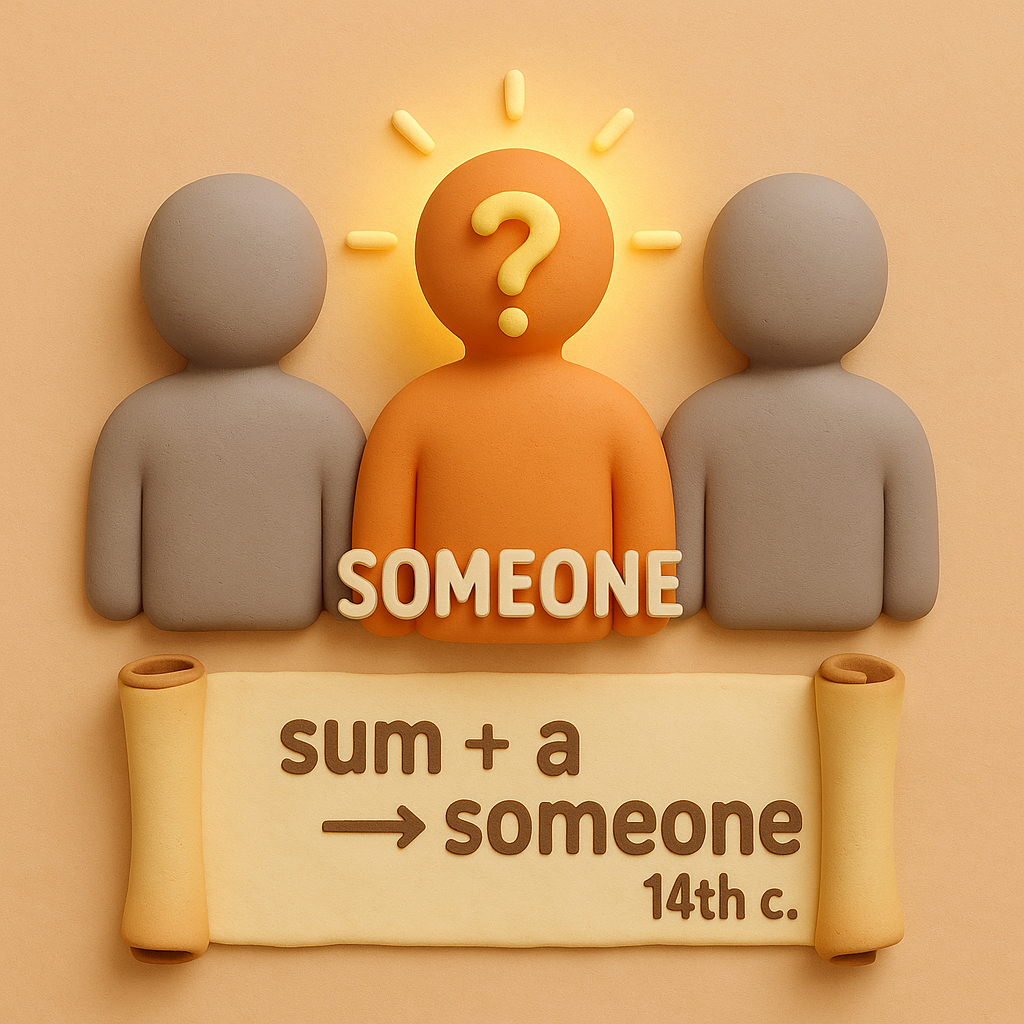Someone
Definition
Someone is a pronoun used to refer to an unspecified or unknown person.
Parts of Speech
- Pronoun
Pronunciation
American English
- IPA Pronunciation: /ˈsʌmˌwʌn/, /ˈsʌmˌwən/
- Respelling: SUM-wun
British English
- IPA Pronunciation: /ˈsʌmˌwʌn/, /ˈsʌmˌwən/
- Respelling: SUM-wun
Etymology
The word "someone" originates from the combination of the Old English terms "sum" meaning "some" and "an" meaning "one." The term has been in use since the Middle English period to refer to an unidentified individual.
Derivatives
- Somebody (pronoun)
- Someone's (possessive)
- Somewhere (adverb, related term)
- Somehow (adverb, related term)
- Someday (adverb, related term)
Synonyms
- Somebody
- Anybody
- One
Antonyms
- No one
- Nobody
- None
Usage
The word "someone" is commonly used in casual and formal contexts to refer to an unspecified individual. For example, "Can someone help me with this task?" or "I think I saw someone outside the window."
Related Terms
- Anyone: Refers to any person, without specificity.
- No one: Refers to the absence of any person.
- Everyone: Refers to all individuals in a group.
Detailed Definitions
Pronoun
- An unspecified or unknown person: Used when referring to a person whose identity is not known or is not relevant.
- Example: "There’s someone at the door."
- Used to indicate a notable person: Sometimes implies importance or significance in a specific context.
- Example: "He thinks he’s someone special."
someone



🇨🇳 Mandarin
- 有人 (someone)
- IPA: /joʊ̯ ɻən/
- Respelling: yǒurén
- 某人 (someone unspecified)
- IPA: /moʊ̯ ɻən/
- Respelling: mǒurén
🇮🇳 Hindi
- कोई (someone)
- IPA: /koɪ/
- Respelling: koi
- किसी (someone unspecified)
- IPA: /kiːsiː/
- Respelling: kisi
🇪🇸 Spanish
- Alguien (someone)
- IPA: /al'gjen/
- Respelling: alguien
- Uno (someone, as in "one should not...")
- IPA: /'uno/
- Respelling: uno
🇫🇷 French
- Quelqu'un (someone)
- IPA: /kɛl.kœ̃/
- Respelling: quelqu'un
- On (someone, as in "one should not...")
- IPA: /ɔ̃/
- Respelling: on
🇸🇦 Modern Standard Arabic
- شخص ما (someone)
- IPA: /ʃaχs maː/
- Respelling: shakhs ma
- أحد (someone, as in "one should not...")
- IPA: /aħad/
- Respelling: ahad
🇧🇩 Bengali
- কেউ (someone)
- IPA: /keu/
- Respelling: keu
- কাউকে (someone unspecified)
- IPA: /kaʊke/
- Respelling: kaoke
🇷🇺 Russian
- Кто-то (someone)
- IPA: /kto-to/
- Respelling: kto-to
- Кое-кто (someone unspecified)
- IPA: /koje-kto/
- Respelling: koje-kto
🇵🇹 Portuguese
- Alguém (someone)
- IPA: /aw'gẽj̃/
- Respelling: alguém
- Uma pessoa (someone, literally "a person")
- IPA: /ˈumɐ pɨˈsoɐ/
- Respelling: uma pessoa
🇮🇩 Indonesian
- Seseorang (someone)
- IPA: /səsəorɑŋ/
- Respelling: seseorang
- Orang (someone, literally "person")
- IPA: /orɑŋ/
- Respelling: orang
🇩🇪 German
- Jemand (someone)
- IPA: /ˈjeːmand/
- Respelling: jemand
- Einer (someone, as in "one should not...")
- IPA: /ˈaɪnɐ/
- Respelling: einer
🇯🇵 Japanese
- 誰か (someone)
- IPA: /dareka/
- Respelling: dareka
- 何者か (someone unspecified)
- IPA: /nanimono ka/
- Respelling: nanimono ka
🇻🇳 Vietnamese
- Ai đó (someone)
- IPA: /ai ɗaw˧ˀ˨ʔ/
- Respelling: ai đó
- Người nào đó (someone unspecified)
- IPA: /ŋwi˧ˀ˨ʔ naːw ɗaw˧ˀ˨ʔ/
- Respelling: người nào đó
🇰🇷 Korean
- 누군가 (someone)
- IPA: /nuɡɯnɡa/
- Respelling: nugunga
- 어떤 사람 (someone unspecified)
- IPA: /əˈdʌn saɾam/
- Respelling: eotteon saram
🇹🇷 Turkish
- Biri (someone)
- IPA: /biɾi/
- Respelling: biri
- Kimse (someone unspecified)
- IPA: /kimse/
- Respelling: kimse
🇵🇰 Urdu
- کوئی (someone)
- IPA: /koɪ/
- Respelling: koi
- کسی (someone unspecified)
- IPA: /kɪsiː/
- Respelling: kisi





